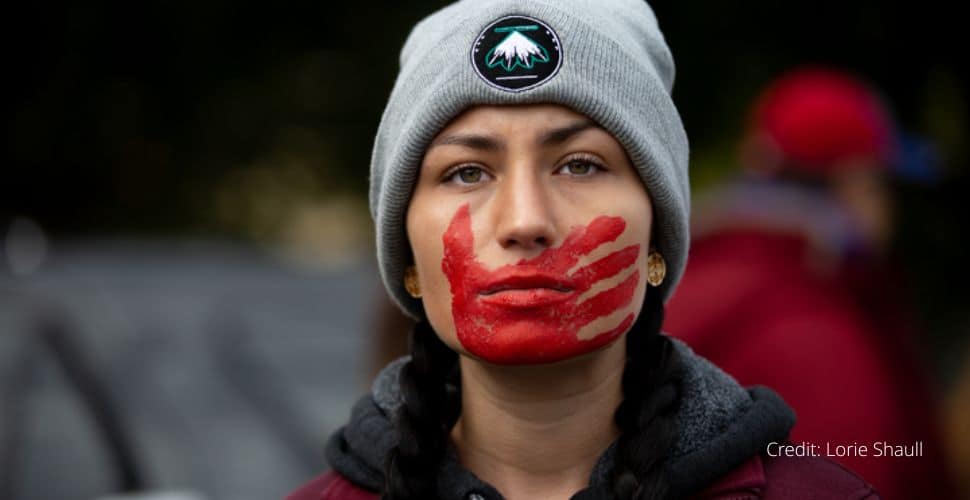The current US administration removed a congressionally mandated report from the Department of Justice under its Diversity, Equity and Inclusion (DEI) purge. The desperately overdue report, Not One More was the result of work by tribal leaders, survivor advocates, and federal partners. This critical work seeks to address trafficking, murder and missing people from Indigenous communities, widely regarded as a crisis.
Missing and Murdered Indigenous People (MMIP) and human trafficking are deeply connected issues. Fueled by colonial violence, systemic racism, and government failures, traffickers target Indigenous women, girls, and Two-Spirit individuals with confidence as their disappearances are too often ignored.
This report documents the systemic gaps that enable trafficking, disappearances, and violence against Indigenous peoples on a scale that continues to devastate indigenous communities. It contains more than 250 testimonies from Indigenous peoples on how the crisis of MMIP has affected their lives. It also carefully outlines urgent recommendations to fix jurisdictional failures and improve coordination between US Marshals Services and tribal law enforcement.
So when the government hides this report, it is dismissing the gravity of this crisis at best. At worst, it dismisses entire sovereign nations, endorses the crises they face and facilitates the continuation of the systemic exploitation of Indigenous peoples.
Why this fight matters right now
In early February of 2025, more than a dozen tribal nations and Indigenous advocacy organizations sent a letter to the administration urging them not to classify Indigenous issues as “DEI,” stressing that tribal nations are sovereign governments, not racial categories. But less than a week later, the Not One More report was no longer available on the Department of Justice’s (DOJ) website.
Since then, bipartisan lawmakers have formally demanded answers and urged the administration to restore the report. The government claims it was removed to “comply with an executive order,” but has offered no further explanation. The Department of Justice has still not committed to reinstating it.
Further, following the removal of the report, federal agencies have flagged hundreds of words to limit or avoid, including, “indigenous community”, “tribal”, and “Native American”. Additionally, the defense department websites removed pages about Indigenous code talkers, whose usage of Choctaw and Navajo languages to communicate messages were vital for winning the first and second world wars.
In response to these extreme actions by the government, Charolette Gonzales, the policy and advocacy director of the Coalition to Stop Violence Against Native Women (CSVANW) said:
Our survivors and our resources truly help decrease the violence that happens in our communities … And so, once we heard this, I think our mind instantly went to the fact that Native women will die if we don’t have federal funding. That’s just a fact.
In early November 2025, senators started publicly demanding the report be restored, bringing public attention to this issue. That’s why we are getting involved now—to build on the momentum of this public pressure.
This report exists because survivors, tribal leaders, and families fought for it. It can be restored if enough people demand transparency—and refuse to let this crisis be ignored.
This isn’t an abstract policy dispute. The administration’s justification—classifying MMIP issues as DEI material—is not only inaccurate but also dangerous. By doing so, the administration is not only dismissing the lived realities of violence faced by Indigenous communities, it is using a bureaucratic excuse to dismantle critical safeguards designed to prevent harm. It directly threatens Indigenous communities’ safety and increases vulnerability to trafficking, exploitation, going missing, and being murdered.
This has life-and-death consequences.
A crisis Indigenous families know too well
Across North America, Indigenous families continue to search for their loved ones alone. Cases are dismissed, investigations stall, and systemic bias leaves families without answers.
As Brandie Dieterle Raddadi, an Indigenous survivor of sex trafficking and MMIP advocate, explains:
While being trafficked I begged Creator for someone, anyone, to notice my injuries, to see my desperation and intervene, but I learned quickly that no help was coming. Official national statistics of MMIP cases are notoriously undercounted. Victim-blaming, racism, hypersexualized racial stereotypes, and a lack of media attention further isolate MMIP victims and families. It is not uncommon to encounter families who have been searching for their missing loved ones for years. Families of MMIP victims, often lacking resources, are left alone to search for loved ones using only the resources they have among them. Help from the authorities is unlikely to be sufficient or effective.
Grass roots volunteer groups such as MMIW Search and Hope Alliance in Oregon have formed to conduct MMIP searches, coordinate public awareness campaigns, and collect resources for victims and their families because law enforcement is often unable/unwilling to provide the resources to do so.
The Not One More report identifies these systemic failures that Brandie knows first-hand. It outlines survivor-centered and trauma-informed steps to address them. It stresses that real progress requires genuine and transparent partnerships between state institutions and Indigenous-led responses. Governments must invest in Indigenous emergency response teams, culturally safe services, trauma-informed care, and structural reforms that dismantle the racist systems enabling the disappearances, violence, and exploitation of Indigenous peoples.
However, the report’s removal and the dismissing of these critical measures make an already deadly crisis even worse.
When governments erase data, Indigenous lives become easier to ignore.
A transparency emergency
The crisis of Missing and Murdered Indigenous People, and its inextricable connection to human trafficking, demands urgent action—not suppressed information.
Restoring the Not One More report is the first step toward accountability, justice, and respecting Indigenous self-determination.
Indigenous communities cannot wait.
Survivors cannot wait.
Families searching for loved ones cannot wait.


Make your voice heard
Comment
8
Share this petition